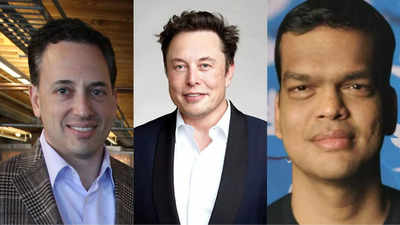
The appointment of Sriram Krishnan as Senior Policy Advisor for Artificial Intelligence at the White House Office of Science and Technology Policy has sparked a heated debate online.
Laura Loomer
, a far-right commentator, took to X (formerly Twitter) to express her disapproval, claiming Krishnan’s appointment was inconsistent with the "America First" agenda. She criticized his support for immigration reforms, including the removal of country-specific caps on green cards, as undermining American STEM graduates and the domestic job market.
Loomer’s accusations prompted swift rebuttals from prominent figures like
David Sacks
and Elon Musk. Sacks clarified the nuances of Krishnan’s views, stating, "Point of clarification: Sriram didn’t say he wants to remove all caps on green cards. He said he wants to remove country caps on green cards. Right now, every country in the world gets allocated the same number of green cards, no matter how many qualified applicants it has. So applicants from India have an 11-year wait, whereas applicants from many other countries have no wait at all. Sriram still supports skills-based criteria for receiving a green card, not making the program unlimited."
Elon Musk succinctly supported Sacks’ position, commenting, "Makes sense."
Laura Loomer's Critique
Loomer’s original post expressed concerns about Krishnan’s alleged alignment with policies she described as harmful to American workers. She labeled his appointment a betrayal of Trump’s "America First" agenda and suggested that figures like Krishnan were attempting to enrich themselves through government contracts.
Loomer’s claims included:
- Accusations that Krishnan’s policies prioritize foreign workers over American STEM graduates.
- Criticism of Trump for allowing individuals she deemed "career leftists" to hold positions in his administration.
The Controversy Around H1B Policies
The
H1B visa program
, which allows US companies to hire highly skilled foreign workers in specialized fields, has long been a contentious issue. Critics argue that the program is often abused, with companies using it to undercut wages and displace American workers. Others view it as a vital tool for attracting global talent, especially in STEM fields.
Krishnan’s advocacy for removing country-specific caps on green cards—not eliminating caps entirely—has been misinterpreted by detractors like Loomer. Current immigration laws allocate the same number of green cards to every country, regardless of demand. This creates significant delays for applicants from high-demand countries like India, who often wait over a decade for approval, while applicants from low-demand countries face no such delays. Krishnan’s position is that merit-based reforms would streamline the process for skilled workers, ensuring the U.S. remains competitive in the global tech economy.
Defending Sriram Krishnan’s Policies
Supporters of Krishnan’s policies, including influential voices like Sacks and Musk, emphasize the importance of attracting skilled immigrants to foster innovation. They argue that:
- Highly skilled immigrants contribute significantly to the US economy, founding companies and creating jobs.
- Immigration reforms that prioritize merit can strengthen America’s position as a leader in technology and entrepreneurship.
- Krishnan’s proposals aim to address inefficiencies in the current system, not to undermine American workers.
Misinterpretations and Political Backlash
Loomer’s criticism reflects broader concerns among some conservatives about immigration policy and its impact on American workers. However, her framing of Krishnan as a "career leftist" and opponent of the "America First" agenda has been widely debunked. Krishnan’s track record includes notable achievements in the tech industry, investments in American companies, and a commitment to fostering innovation domestically.
The Role of AI and Immigration in US Policy
As Senior Policy Advisor for AI, Krishnan’s primary focus will be shaping the nation’s strategy on artificial intelligence. However, the debate surrounding his appointment underscores the intersection of technology, immigration, and politics. While some view his stance as progressive, others interpret it as a challenge to traditional conservative values. The ongoing discourse highlights the complexities of balancing economic growth, national security, and
immigration reform
in an increasingly competitive global landscape.
Indians and H1B Visa
The H1B visa issue for Indians stems from systemic inefficiencies and outdated immigration policies in the US, particularly around green card allocation. The primary bottleneck lies in the per-country cap on employment-based green cards, which limits the number of green cards any single country can receive annually to 7% of the total pool. This cap applies uniformly, regardless of the size of a country’s population or the demand for visas from its citizens.
India, with its large pool of highly skilled professionals, particularly in technology and STEM fields, produces a disproportionately high number of applicants for H1B visas and green cards. Due to the 7% cap, Indian applicants face staggering delays—sometimes waiting over a decade for green card approval. In contrast, applicants from smaller countries with fewer applicants may experience little to no wait time.
The H1B program allows US companies to hire foreign workers in specialized fields, but these workers often aim to transition to permanent residency through green cards. The backlog disproportionately affects Indians, as the demand from this group far exceeds the allocated number of green cards. This leads to years of uncertainty for workers and their families, with challenges like visa renewals, restrictions on job mobility, and limitations on spousal employment.
Advocates for reform, including figures like Sriram Krishnan, propose removing country-specific caps to prioritize merit and streamline the process for skilled workers. Critics argue that such reforms might disadvantage American workers by intensifying competition. However, supporters emphasize that highly skilled immigrants drive innovation, create jobs, and strengthen the US economy. Addressing this issue requires balancing global competitiveness with fairness in immigration policy to alleviate backlogs and retain top talent in the US.

 13 hours ago
2
13 hours ago
2










 English (US) ·
English (US) ·